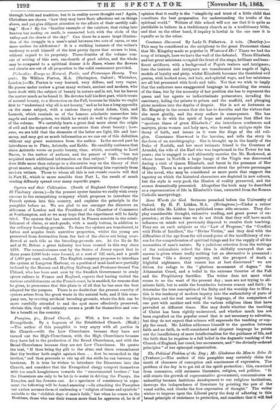Pillocarta: Essays on Natural, Poetic, and Picturesque Beauty. Two parts.
By William Parton, M.A. (Shrimpton, Oxford ; Whittaker, London.)—Mr. Parton is very learned, very diffuse, and very vague. He passes under review a great many writers, ancient and modern, who have dealt with the subject of beauty in nature and in art, but he leaves the matter much as he found it. He devotes half his first part, which treats of natural beauty, to a discussion on the Fall, because he thinks we ought first to " understand why all is not beauty," and as he has a long appendix on the same subject, with a curious theory about Adam, Cain, and Lamech, which reminds us of the famous scholastic researches into angels and needle-points, we think he would do well to change the title of the volume. We certainly learn a great deal more about the origin of evil and the nature of our early ancestors than about beauty ; how- ever, we are told that the elements of the latter are light, life and har- mony, and may get as much information as we can out of this definition without any great assistance from the author. In the second part he introduces us to Plato, Aristotle, and Keble. He candidly confesses that since Aristotle wrote on poetic beauty, time, which, according to Lord Bacon, is the author of authors, and the parent of truth, "has not acquired mach additional information on that subject." He accordingly does little more than enlarge in a discursive way on the theory of that great master, adopting his definitions and illustrating him copiously from modern writers. Those to whom all this is not crambe recocta will find in Part IL, which is more sensible than Part I., the result of much reading diffusely spread over many soporific pages.






























 Previous page
Previous page